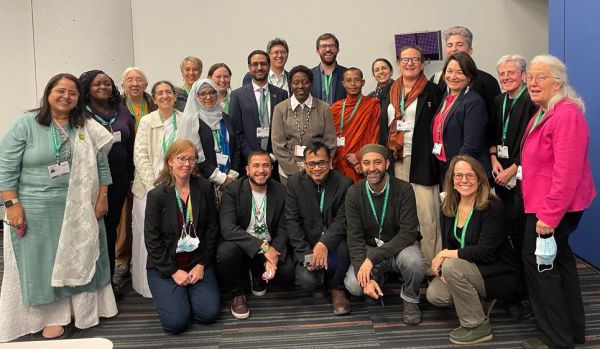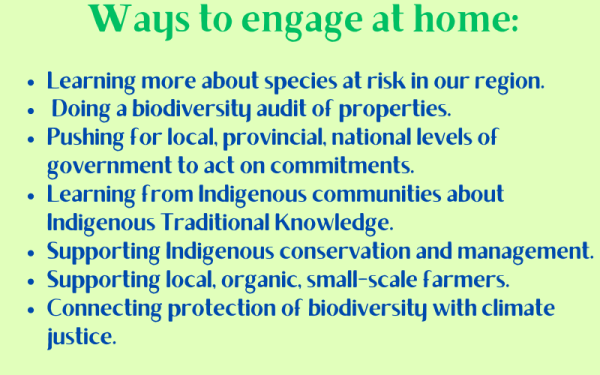COP15 Reflection
 This past December, I was fortunate to have the opportunity to be part of a delegation to the UN Conference on Biological Diversity (COP15) in Montreal. When I heard that the conference would be taking place in Canada (though China was the official host), I knew it was important that faith communities and wider civil society networks show up and make clear our care for the planet, for the land and water, for all species, and to be part of the work to protect biodiversity in the decade ahead. It is a crucial moment for all life on our fragile planet.
This past December, I was fortunate to have the opportunity to be part of a delegation to the UN Conference on Biological Diversity (COP15) in Montreal. When I heard that the conference would be taking place in Canada (though China was the official host), I knew it was important that faith communities and wider civil society networks show up and make clear our care for the planet, for the land and water, for all species, and to be part of the work to protect biodiversity in the decade ahead. It is a crucial moment for all life on our fragile planet.
COP15 took place over two weeks and involved over 180 countries – over 17,000 people were there as delegates and participants. The purpose of the conference was to develop a Global Biodiversity Framework that would commit the world to a plan to address biodiversity loss over this decade. The conference parties (states that have signed the UN Convention on Biological Diversity) worked with a draft developed ahead of the event and spent long days negotiating the document clause-by-clause.
While negotiations were taking place, many events were happening that highlighted the topics and themes relevant to the framework. This ranged from species, land, and water protection to human rights-based approaches to nature positive and nature-based solutions.
I was part of the Society of St. Columban delegation, which was one of the leaders in organizing a Multifaith Coalition, which offered recommendations for what faith communities wanted in the Global Biodiversity Framework, and hosted a Faith Pavilion where events and activities took place. It was wonderful to meet faith representatives from around the world and learn about what they are doing to protect biodiversity. We had an opportunity to learn from each other, share meals, and pray together. We also had the great honour of meeting with the Executive Secretary of the Convention on Biological Diversity, Elisabeth Mrema, who shared with us the importance of a faith presence at the event for those negotiating the framework.
I was also happy to take part in the March for Biodiversity and Human Rights with fellow delegates and faith groups. We had a very cold, two-hour march through Montreal, but we were inspired to see hundreds of people coming together to call for real action to protect biodiversity.
As the week proceeded, it was clear that there were points of tension in the negotiations. Countries in the Global South wanted to make sure that the agreement included human rights protections and protections for Indigenous and local communities to ensure that conservation did not remove them from their land. There were also calls to ensure that Indigenous and local communities have an ongoing leadership role as they are already protectors of over 80% of the world’s biodiversity.
Each day, there would be updates from different organizations involved in the negotiations at press conferences. These were important and helpful ways to see where the key challenges were in the negotiation process and where progress was being made. It was also a way to share this information with the public and civil society. We were particularly interested in Canada’s commitments and what kind of leadership role our country was taking in the process.
I left before the outcome of the conference, but members of the Multifaith Coalition stayed until the early morning hours of the final day when the framework document was approved. So, the conference ended with what is being called the Kunming-Montreal Global Biodiversity Framework. The framework makes significant commitments that include many recommendations that civil society and faith groups wanted to see. These include:
♦ Effective conservation and management of 30% of lands and waters (inland, coastal, and ocean).
♦ Restoration underway or completed of 30% lands and waterways.
♦ Cut to zero loss of areas of high biodiversity importance.
♦ Cut global food waste in half, reduce over-consumption, and first ever mention of “agroecology” (sustainable farming that works with nature).
♦ Halt human induced extinction of all threatened species.
♦ Protection of traditional knowledge in use of genetic material and fair and equitable sharing.
♦ Prioritize the rights and roles of Indigenous peoples and local communities.
♦ Ensure adequate means to implement the framework, including funding.
Canada also made important commitments, including:
♦ $350 million in new financing for biodiversity.
♦ $800 million over 7 years to four Indigenous-led conservation projects.
♦ Strong support for the target of protecting 30% of biodiversity (Iands and waters) by 2030 (currently at 13.5% of lands and 14.6% of waters).
♦ Support for Indigenous leadership in conservation management and planning.
♦ Committed to legislating federal protected areas targets and creation of accountability act to do so.
The key now is how and when these commitments will be implemented – so, civil society groups are calling on the government of Canada to quickly follow through on creating an accountability act. It is also essential that biodiversity protection is deeply integrated with efforts to respond to the climate crisis, particularly through a just transition.
Faith communities that took part in COP15 and our networks will continue the work of care for our planet and all species, through our education and advocacy efforts. I certainly left COP15 feeling like our voices and presence at these events matter, and now is the time to come together and ensure these commitments will be implemented.
Martha Justice Ministry at COP15 slideshow:
More on COP15, including faith reflections:
- Kunming-Montreal Global Biodiversity Framework (final document)
- Convention on Biological Diversity (website)
- Faiths at COP15 (Multifaith Coalition website)
- Faiths at COP15 YouTube channel (videos of panel discussions)
- Singing with the Earth: Catholic Responses to Creation Care (Faiths at COP15 video)
- Evaluation of COP15 Kunming-Montreal GBF (Faiths at COP15 video)
- EarthBeat COP15 coverage (series - National Catholic Reporter)
- March for Biodiversity and Human Rights interviews (video - Montreal Gazette)
- Coming Home – We are part of the land that we know (reflection by Josianne Gauthier, CIDSE)
- Advent of an epiphany on biodiversity (reflection by Joe Gunn, Centre Oblate – Catholic Register)
- Protecting Biological Diversity Requires a Just Transition (Dr. Sue Wilson, CSJ)

Photo on top of the page: Multifaith Coalition with the Executive Secretary of the Convention on Biological Diversity, Elisabeth Mrema


.png)
